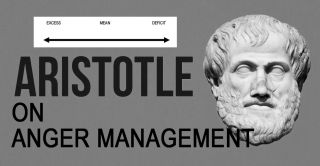Anger
The Wisdom of Aristotle on Anger Management
Balance is everything.
Posted March 28, 2023 Reviewed by Abigail Fagan
Key points
- Anger can be a destructive power, and it can be a positive force of change.
- For anger to be valuable and effective, it must be balanced.
- By cultivating mindfulness, compassion and wisdom, we can use anger constructively.

Anger is a potent emotion. Instinctive anger can be a forceful and destructive power. Anger can also be a positive force for growth and change. For anger to be valuable and virtuous, it must be balanced—that is tempered to be proportionate to the situation at hand, and grounded in wisdom.
In Nicomachean Ethics, Aristotle wrote:
“Anybody can become angry; that is easy. But to be angry with the right person and to the right degree and at the right time and for the right purpose, and in the right way—that is not within everybody’s power and is not easy.”
Dimensions of Responding to Anger
Let’s look at Aristotle’s dimensions of responding to anger.
For the Right Purpose
The first fundamental dimension is being angry for the right purpose, or for the right reason. Your main goal should be the starting point of all decisions and actions. Ideally, your actions will be oriented toward what is good, what is healthy, and what is right—toward the thing that serves your best interest in the long run.
Virtuous anger is led by reason and moral judgment that promotes justice and fairness. The function of anger is to motivate you to fix a problem or right a wrong, as well as to improve a situation. It is about protecting yourself and others, restoring integrity, cultivating love, and attaining self-actualization. It is also about pursuing goals that are within your control, rather than those beyond your control. Virtuous anger pushes you toward achieving harmony between yourself and the world around you, rather than separating them and setting one against the other.
Toward the Right Person
Learning to balance your anger includes developing the ability to correctly identify the responsible party. As such, anger must be directed toward the correct target. It is important to know with whom to be angry. At times, we get irritated with our spouse when we are really mad at our boss. Or we yell at our kids when in fact we are angry with our spouse. Or we give the cashier a hard time when we are simply upset that the store didn’t have the item we came in for.
These are all examples of displaced anger. Misdirecting your anger won’t help you solve the problems you face. In fact, it’s likely to make the situation even worse. This “strategy” can destroy your relationships, your career, and your reputation.
To the Right Degree
Each situation is different and thus requires a different response. How bad is the wrong that has been inflicted, and how weighty an action is required to “correct it?” Balanced anger is about articulating a proportional response to the situation. If your teenage son rolls his eyes at you and makes a sarcastic remark, it is appropriate to take away the privilege of playing video games for the day. However, screaming at him would be a disproportionate response. When you feel you’ve “lost it,” you are likely overreacting.
Balanced anger requires you to take a position that respects both yourself and the other person. It is neither passive nor aggressive; you are neither a victim nor a villain. You consider the purpose of your anger and then choose your response to produce the desired impact.
Most importantly, balancing anger involves examining the possible consequences. Will an extreme reaction help you achieve your goals, or will it escalate the situation? Will it move you toward a healthy long-term solution? Asking these questions can help you temper your response to anger to the right degree.
At the Right Time
Have you ever said something you thought was right, only to realize an hour or a day later that it was inappropriate, hurtful, or simply wrong? Have you ever found yourself thinking I wish I could go back and change what I said?
Timing is everything. Knowing when to respond is a critical factor for balancing one's anger. Sometimes, even with all the best intentions, we know what we want to say and why, but when we do say it, it comes out the wrong way. Maybe we were still angry, and our body language or tone of voice conveyed aggression. Maybe the other person was feeling angry or stressed and was not ready to listen. The words may have been right, but our timing was simply off. Balancing anger includes responding at the proper time—time that allows for an optimal outcome.
In the Right Way
To use anger wisely, anger should be directed toward ethical excellence. You must be sure you are not misdirecting your anger and holding the wrong person responsible. Anger must tempered to be proportionate to the occasion and the context. In each case, “right” refers to what is healthy, what is optimal, and what serves you and your loved ones in the long term. It is important to ground your actions in wisdom and compassion.
Anger points you toward your core needs, but it is important also to have the humility to question what you truly need. Any of your needs can be pursued in a way that’s misguided or dysfunctional. Imagine that you are becoming increasingly resentful towards your partner for not doing enough around the house. You may feel righteous and justified in being critical, but that does not mean that the situation is objectively unfair or that criticism will be effective in changing it.
Mastering Balanced Anger
Anger is triggered to bring your attention to your core needs, to stand up for your rights as well as the rights of others. It alerts you to perceived wrongs and provides a guide to righting them. It points you toward protection, integrity, love, and actualization. To work skillfully with anger, we must rationally analyze it and reevaluate its validity, its purpose, and its meaning. This allows us to come to a more nuanced and accurate interpretation. Using mindfulness and compassion, we can uncover the wisdom beneath our anger and then act on it. Anger shows you how to achieve what is important to you, and orients you toward fulfilling your needs and goals. As Aristotle wrote, when used in a balanced way anger can be a catalyst for profound awakening—a portal to emotional liberation, relationship enhancement, and personal fulfillment.
References
Aristotle (1984). Nicomachean Ethics. In J. Barnes (Ed.), The Complete Works of Aristotle: The Revised Oxford Translation. Princeton University Press.




